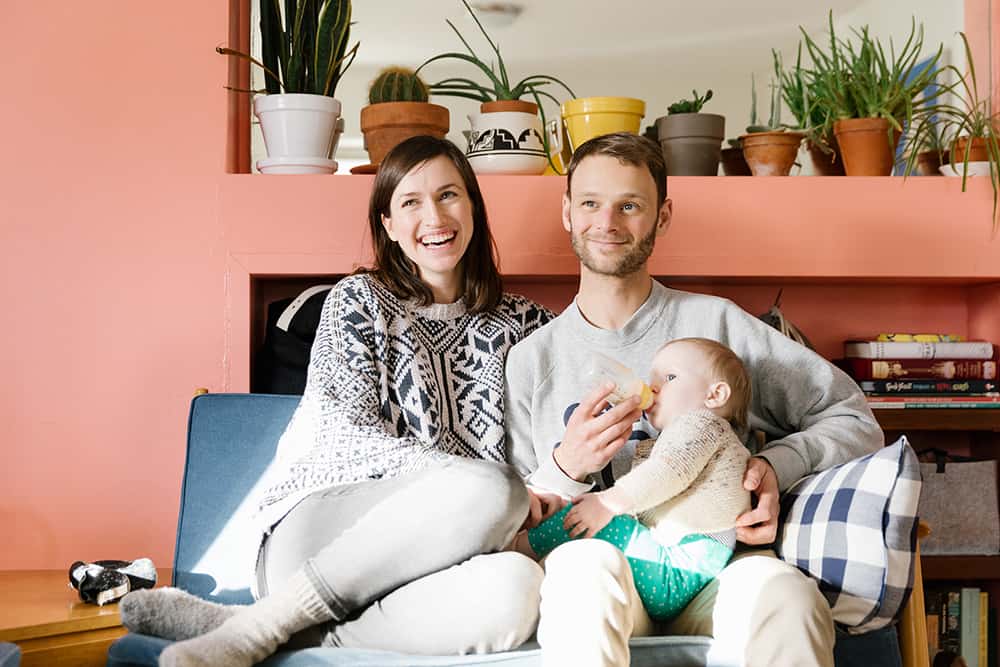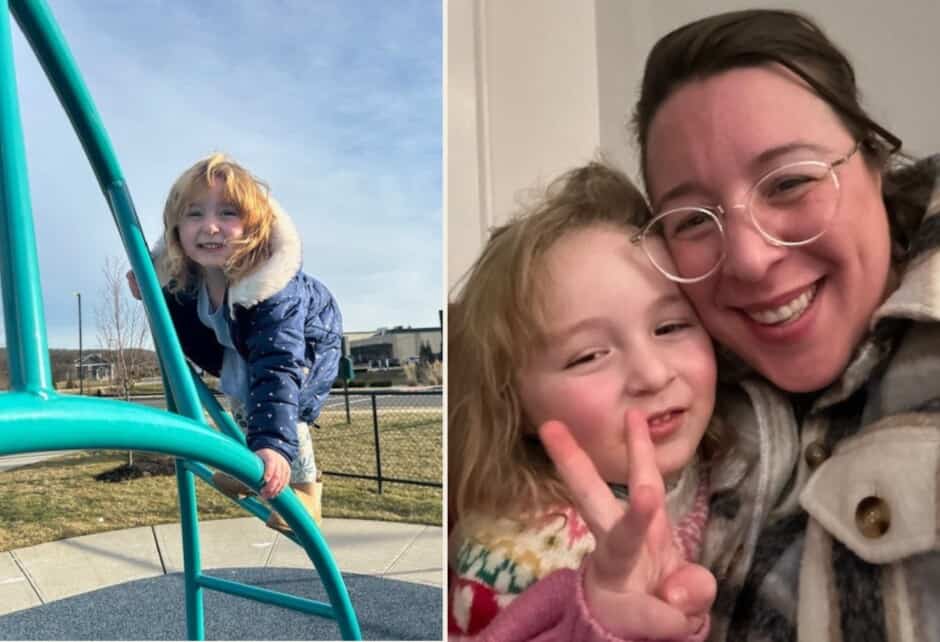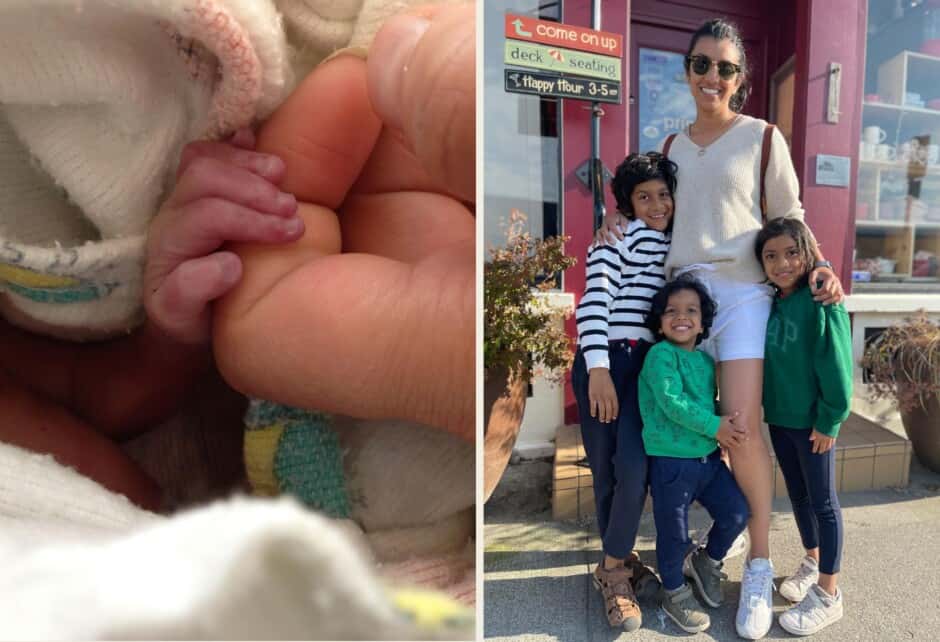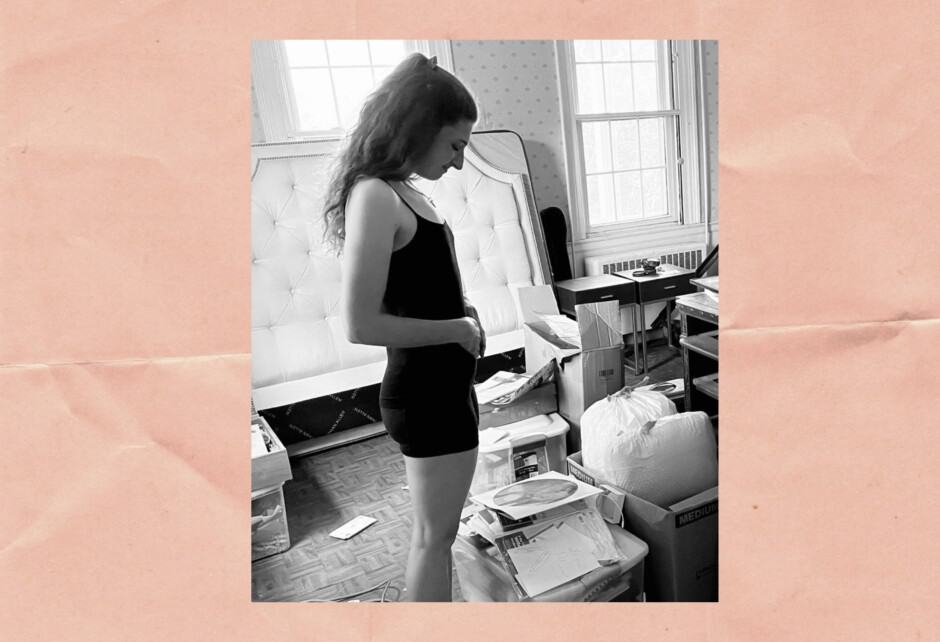
New Baby, New Crisis: Having Babies Amid Cancer and Covid
Written by Lindsay Welsch Sveen
Photography by Anna Powell Denton
Having a brand-new baby to care for already involves multiple obstacles. Add in a new cancer diagnosis and COVID-19 lockdowns, and the crisis compounds. Below, Indiana-based writer and mother of two Lindsay Welsch Sveen eloquently shares her personal experience of two extra-chaotic and harrowing postpartum experiences.
We sobbed in the Target parking lot.
It was a Friday afternoon, around 5 o’clock. We had just bought some essentials for our new life: diapers, wipes, some patent-pending swaddling garment we hoped would buy us some sleep. (It didn’t.) My husband, Sam, got a phone call as we were leaving the store.
“…are you alone”
“…wife or family member with you”
“…didn’t want to keep you guessing”
“Hold on a sec. Let us get to our car.” I sat in the driver’s seat. Sam turned on speaker phone. In a stream of doctor-speak, the phrase “suspicious of lymphoma” rang out several times. Sam sat quietly. I took charge, dutifully asking questions that I could imagine a person asking in such a situation.
“What type of lymphoma?”
“What type should we be hoping for?”
“What’s the next step?”
The doctor said she’d schedule a biopsy for the following week and mentioned some resources we could find online. She sounded appropriately apologetic—and reluctant to say anything too definitive.
Sam hung up. Then we sobbed in the Target parking lot. Mara, six weeks old, sat calmly in her carseat.
Sam had gone in for some tests earlier that week. For months now, his lymph nodes had been swollen and he had been waking in the night, drenched in sweat. We thought it was stress—when it started, he had just closed his coffee business and I was pregnant with our first baby. He called in November but, with no established primary care doctor, he couldn’t get an appointment for months.
It had already been an exhausting week. Mara had been diagnosed on Monday with a dairy sensitivity. She would likely grow out of it, but it could take a while. In the meantime, I would need to strip all dairy from my diet if I wanted to breastfeed without sending her into fits of agony. No big deal for some people, perhaps, but my diet previously centered on butter, ice cream, and Siggi’s yogurt. It was going to be a major adjustment. So while I had some low-level nerves about Sam’s appointment and tests that week, it wasn’t my foremost concern.
I knew it was just going to be stress. It couldn’t be cancer—that would be an outrageous thing for life to hand us right now. We had already had our share of tragedy. My sister’s death the previous year. My own cancer scare just months before (a lump in my breast that turned out to be benign). And we had a brand new baby. There was just no way.
As my friend Aubrey says, there’s no quota on struggle. No tragedy punchcard. Sometimes it just keeps coming.
Before Mara’s birth, I had learned how crucial the postpartum period is for new mothers, how the mother needs to rest and focus on her healing. I had looked forward to that time when, like my baby, I would be held in a bubble of care and support. I would be revered for what my body had done. I would be treated like a damn queen.
With Sam’s diagnosis, my postpartum bubble popped.
The next few weeks were the worst. Tests, procedures, radioactive scans. The shock was slowly sinking in, as we woke up each morning and remembered. Meanwhile, the dairy was taking its sweet time getting out of my system, so Mara’s fussiness continued. I typed things like “Can your baby tell if you’re crying all the time?” into my phone. Actually, I only got as far as “Can your baby tell” when Google auto-populated the rest. I wasn’t sure if I should be sad about how many people must have been searching for that same answer, or comforted to know that I wasn’t alone.
Sam was officially diagnosed with Hodgkins lymphoma, stage 2, thankfully a very treatable form of cancer. He got an IV port implanted in his chest and started chemotherapy. I went back to work and did my best to care for both Mara and Sam (with help from our incredible community of friends, family, therapists, and caregivers).
The next six months are a blur. I can say with certainty that they were difficult, but I can’t provide much detail. Nurses. IV bags. Tears. Smiles. Talks. Silence. Working. Pumping. Nursing in the dark. Lugging groceries. Exhaustion. Sunshine. Chunky baby legs dangling over the porch swing.
****
Two years later, I dreamed again of my ideal postpartum experience. I was pregnant with our second daughter, Plum, and everything was going great. Sam was healthy, Mara was thriving, and I was looking forward to a “normal” postpartum period.
Hello, Covid-19.
I’m a chronic optimist, but at my March appointment my doctor seemed more concerned about the coronavirus than I had expected. I decided to work from home for a few weeks.
Plum wasn’t due until July. Surely this would be over by summer. I’ll start worrying in May, I told my friends, not believing that I would have to.
May came.
June.
July.
I finally let it hit me. I would never know a “normal” postpartum experience.
Friends and podcasts told me it was ok to feel a sense of mourning, to grieve what I had thought was to come. My boss was understanding when I had tears running down my face during a Zoom call.
In lighter moments, I half-joked about writing a book: Cancer vs. Covid—A Postpartum Pity Party.
If it’s a contest for which period of time was more difficult, I honestly can’t pick a winner. They have been opposites in many ways. With cancer, our little family was special. We were dealt a tough hand, and our community showed up to help in so many big and small ways. With the pandemic, we are not special. The entire world faces this challenge. And we are incredibly privileged—we have jobs, insurance, and a trusted childcare pod. Still, our friends and family cannot come give us what we most need: help, hands, hugs.
Help, hands, hugs—these are the essential gifts of postpartum life, and these are what the pandemic has made impossible for a new generation of babies and mothers. This is an enormous loss.
****
In both situations, did I feel cheated? Yes. Did I feel angry? Yup. Did I feel sorry for myself? For sure.
But here’s the (perhaps very obvious) thing I realized: Extenuating circumstances can make having a new baby more difficult, but it is never easy.
Crisis has one thing going for it—it has a name. Cancer. Covid. Having babies in these situations makes the pain socially legible. You can point to the disease and say, “Look, this is the load I bear.”
Cancer and Covid gave me big names for my pain. Yes, caring for a new baby and a sick husband was hard, and it taught me that I am stronger than I realized. And yes, having a baby in a pandemic has been challenging, and it has reminded me how important my friends and family are.
But the big lesson has been this: The Crisis-with-a-capital-C makes visible the many lowercase crises that have been normalized in our culture for too long.
Every postpartum experience brings with it tiny crises, micro-catastrophes, ruptures of self and sanity. Some of these may be nameable—postpartum depression, mastitis, jaundice, tongue tie, sleep deprivation, medical bills, being Black in a country with a grossly disproportionate maternal mortality rate. But those names are barely legible to the broader population. They don’t play on the world stage. Politicians don’t declare states of emergency for postpartum depression. Greeting card companies don’t have an I’m-sorry-you-have-to-go-back-to-work-so-soon category. Hollywood producers don’t make movies about mastitis (but shout out to Jane the Virgin for representing this on screen!).
In the homes of so many families and in the bodies of so many new mothers, these everyday crises strike when we are already spent, already under-resourced, and already isolated from the forward hum of the world outside.
So I’m not writing Cancer vs. Covid: One Mother’s Exceptional Tale. I’m thinking about what we call “normal” childbearing and “normal” postpartum experiences. I’m thinking about how it is always too much to bear and how we somehow do it anyway.
Are you a mother with something to say? Send us an email to be considered for our “Mom Talk” column.
Share this story



